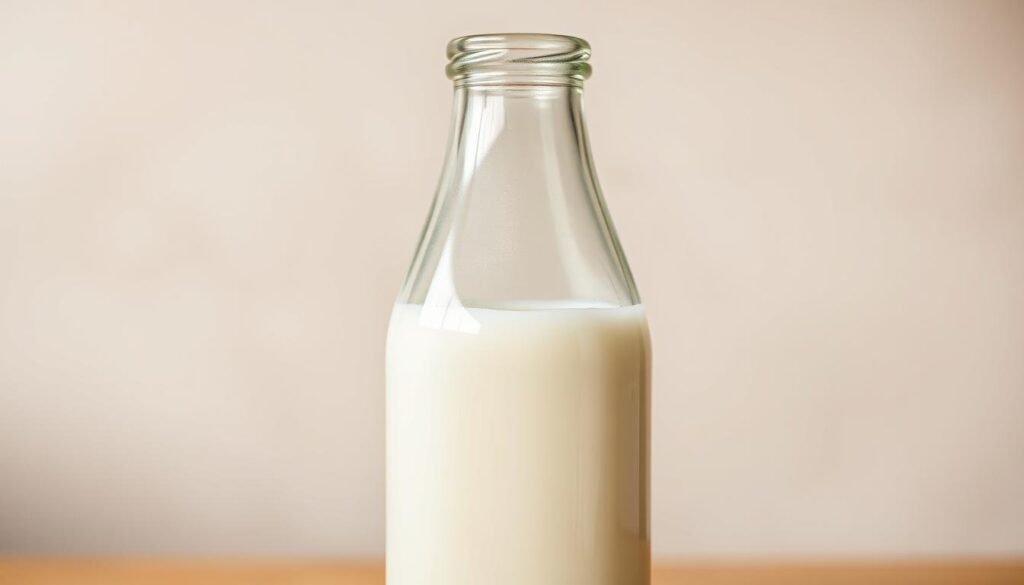If you’re a dog owner, you know how tough it can be to deal with your pet’s allergies. Many pet owners are now trying goat milk as a possible answer to their dogs’ diet needs.
But is goat milk safe for dogs with allergies? Does it help with dog allergies or could it be harmful? We’ll look into the good and bad sides of using goat milk for your allergic dog. This will help you decide what’s best for your pet’s health.
Contents
- 1 Understanding Dog Food Allergies and Sensitivities
- 2 Nutritional Profile of Goat Milk
- 3 Is Goat Milk Safe for Dogs with Allergies?
- 4 Potential Benefits of Goat Milk for Allergic Dogs
- 5 Possible Risks and Considerations
- 6 How to Introduce Goat Milk to Your Dog’s Diet
- 7 Alternatives to Goat Milk for Dogs with Allergies
- 8 Conclusion
- 9 FAQ
- 9.1 Is goat milk suitable for dogs with dairy allergies?
- 9.2 Can goat milk help with my dog’s digestive issues?
- 9.3 How do I introduce goat milk to my dog’s diet?
- 9.4 Are there any alternatives to goat milk for dogs with allergies?
- 9.5 Can I use goat milk as a replacement for my dog’s current milk or dairy products?
- 9.6 How do I know if my dog is allergic to goat milk?
- 9.7 What are the benefits of goat milk for dogs with skin allergies?
Understanding Dog Food Allergies and Sensitivities
If you’re struggling to manage your dog’s allergies, you’re not alone. Dog food allergies and sensitivities are common issues that can cause discomfort and health problems for your furry friend. Understanding the underlying causes of these allergies is crucial in determining the best course of action.
Dog food allergies occur when your dog’s immune system reacts to a particular ingredient in their food. This reaction can lead to a range of symptoms, from mild discomfort to life-threatening conditions. Identifying the allergen is key to managing the allergy.
Protein-Based Allergens
Protein-based allergens are among the most common culprits behind dog food allergies. These allergens can be found in ingredients such as:
- Beef
- Chicken
- Dairy products
- Lamb
- Fish
These protein sources are often used in dog food because they are high in protein and considered nutritious. However, for dogs with allergies, these ingredients can trigger allergic reactions.
Grain and carbohydrate sensitivities are another aspect of dog food allergies. Some dogs may react to grains such as:
- Wheat
- Corn
- Soy
Carbohydrate sensitivities can also occur, particularly in dogs with sensitive digestive systems. Managing these sensitivities often involves switching to a hypoallergenic dog food that avoids common allergens.
Understanding whether your dog’s allergy is caused by a protein, grain, or carbohydrate is essential for selecting the right diet. Hypoallergenic dog foods are designed to minimize the risk of allergic reactions, making them a valuable option for dogs with sensitivities.
Nutritional Profile of Goat Milk
Goat milk has a nutritional profile that might be good for dogs with sensitivities. It’s full of essential nutrients. This makes it a unique choice for canine health.
Goat milk is different from cow milk because of its protein structure. It has a casein protein that dogs might find easier to digest. This unique protein composition is great for dogs with dairy allergies or sensitivities.
The proteins in goat milk are smaller and make softer curds. These are gentler on a dog’s stomach. This makes goat milk a better choice for dogs with sensitive stomachs.
Fat Content Comparison
Goat milk also has a different fat content than cow milk. It has smaller fat molecules, which makes it easier for dogs to digest. This could be why goat milk is good for dogs with allergies or sensitivities.
Goat milk is also full of medium-chain fatty acids. These fatty acids are good for a dog’s skin and immune system. So, goat milk’s benefits for dogs go beyond just its protein structure.
In short, goat milk’s unique protein and fat content make it a strong choice for dogs with allergies or sensitivities.
Is Goat Milk Safe for Dogs with Allergies?
If your dog has allergies, you might wonder about goat milk. Goat milk is nutritious but comes with risks. It’s important to be careful when adding it to your dog’s diet.
One big worry is if your dog is allergic to goat milk. Even though it’s often seen as hypoallergenic, some dogs might still react. It’s key to watch your dog’s health after adding goat milk.
Before trying goat milk, talk to your vet. They can guide you based on your dog’s allergies and health.
Start with small amounts of goat milk to see how your dog reacts. Look for signs like itching, digestive issues, or skin problems. If your dog does well, you can slowly increase the amount with your vet’s help.
Choose a high-quality goat milk made for dogs. These products are made to reduce allergy risks and are often enriched with extra nutrients.
In short, goat milk can be good for your dog’s diet, but safety depends on your dog’s reaction. Always check with a vet before changing your dog’s diet.
Potential Benefits of Goat Milk for Allergic Dogs
Dogs with allergies might find relief in goat milk. It’s known for supporting health, especially in the digestive area.
Probiotic Properties
Goat milk has probiotics that boost your dog’s gut health. Probiotics are beneficial bacteria that keep the digestive system healthy. A healthy gut is key for your dog’s well-being, helping with nutrient absorption and immune system balance.
Goat milk’s fat and protein might be easier for dogs to digest. This could lower the chance of allergic reactions. Its smaller fat molecules are better for dogs with sensitive stomachs or allergies compared to cow milk.
Some benefits of goat milk for dogs with allergies include:
- Easier digestion due to its unique fat content and protein structure
- Probiotic properties that support gut health
- Potential reduction in allergy symptoms due to its nutritional profile
Possible Risks and Considerations
When thinking about goat milk for your dog’s allergies, knowing the risks is key. Goat milk is often seen as better, but it can still cause problems for some dogs.
One big risk is an allergic reaction to goat milk. Dogs might get sensitive to its proteins or other parts. Watching your dog closely after introducing goat milk is very important.
If your dog seems to react to goat milk or other foods, testing can help. There are different allergy tests for dogs, like:
- Elimination diets, where you remove suspected allergens to see if symptoms get better.
- Blood tests, which check the level of antibodies against certain allergens in your dog’s blood.
- Skin tests, where a small amount of potential allergen is put on the skin to see if there’s a reaction.
Talking to a vet to find the best test for your dog is a big step. They can explain the results and help you decide on your dog’s diet.
Knowing the risks and getting the right tests can help you use goat milk safely. This way, you can protect your dog’s health while possibly improving their diet.
How to Introduce Goat Milk to Your Dog’s Diet
Introducing goat milk to your dog’s diet should be done slowly. This slow introduction helps avoid digestive problems. It also lets your dog’s body get used to the new food.
Start by adding a small amount of goat milk to their regular food. Begin with a mix of 1 part goat milk to 4 parts of their usual meal. Slowly increase the goat milk over 7-10 days. This lets your dog’s digestive system adjust.
Watch your dog for signs of intolerance or allergy. Look for digestive issues, skin rashes, or itching. If you see any bad reactions, cut back or stop using goat milk.
Storage and Preparation Tips
Storing and preparing goat milk right is key. Always keep it in the fridge at a temperature below 40°F (4°C).
If using powdered goat milk, follow the instructions for mixing. You’ll need to mix the powder with water as directed.
Always check the expiration date and look for spoilage before giving goat milk to your dog.

Think about your dog’s needs and health when introducing goat milk. Dogs with allergies or sensitivities may need a careful approach.
- Always talk to your vet before changing your dog’s diet.
- Keep goat milk away from sunlight and heat.
- Use clean tools and equipment when handling goat milk to avoid contamination.
Alternatives to Goat Milk for Dogs with Allergies
Looking for alternatives to goat milk is a good idea for dogs with allergies. Goat milk is nutritious, but some dogs might still have reactions. Others might just want to try something different.
Bone Broth
Bone broth is a great choice for dogs with allergies. It’s packed with protein, collagen, and minerals. Rich in nutrients, it helps heal the gut and can lessen allergy symptoms.
To make bone broth, bones are simmered for 24 hours. This extracts all the good stuff. Make sure to use quality bones and avoid onions or garlic.
| Benefits of Bone Broth | Nutritional Content |
|---|---|
| Improves gut health | High in protein and collagen |
| Reduces allergy symptoms | Rich in minerals like calcium and phosphorus |
Coconut Milk
Coconut milk is another option for dogs with allergies. It’s full of healthy fats and can be a tasty treat. But, start with small amounts to avoid upset stomachs.
Coconut milk has MCTs, which are anti-inflammatory. They can calm the digestive system.
| Comparison of Alternatives | Goat Milk | Bone Broth | Coconut Milk |
|---|---|---|---|
| Nutritional Profile | Rich in calcium, vitamins | High in protein, collagen | Rich in healthy fats, MCTs |
| Allergy Friendly | Often hypoallergenic | Generally well-tolerated | Can be introduced gradually |
When looking for goat milk alternatives, talk to a vet. They can help pick the best option for your dog’s allergies and diet.
Conclusion
Goat milk can be a good choice for dogs with allergies. It has nutrients and might be easier for them to digest. This makes it a great alternative to common dog foods.
But, it’s important to think about the good and bad sides before adding it to your dog’s diet. Talking to a vet is key to make sure your dog stays healthy and happy.
In summary, goat milk can be a good addition to your dog’s diet. Just make sure to introduce it slowly and with your vet’s advice.
FAQ
Is goat milk suitable for dogs with dairy allergies?
Goat milk might be okay for dogs with dairy allergies because it’s different from cow milk. But, always talk to a vet before changing your dog’s diet.
Can goat milk help with my dog’s digestive issues?
Goat milk has probiotics that can help your dog’s gut. It might also be easier for them to digest because of its fat content.
How do I introduce goat milk to my dog’s diet?
Start by mixing a little goat milk with your dog’s food. Slowly add more over time. Remember to keep the milk fresh to keep its nutrients.
Are there any alternatives to goat milk for dogs with allergies?
Yes, you can try bone broth or coconut milk. They offer similar benefits and might be better for your dog’s needs.
Can I use goat milk as a replacement for my dog’s current milk or dairy products?
Goat milk can be a good addition to your dog’s diet. But, always check with a vet first. They can guide you on how to add it.
How do I know if my dog is allergic to goat milk?
Watch your dog’s behavior and health after adding goat milk. If they react badly, see a vet. They can suggest allergy tests.
What are the benefits of goat milk for dogs with skin allergies?
Goat milk has nutrients and probiotics that can help your dog’s health. This might help with skin allergies. But, talk to a vet to find out why your dog has allergies.

Derrick Wilcox is a certified canine behaviorist with over 12 years of experience at Happy Paws Animal Clinic and Pawsitive Training Center, helping pet owners ensure safer, healthier, and happier lives for their dogs.



